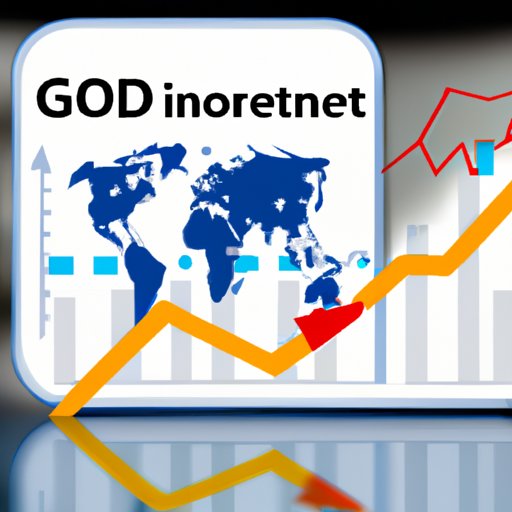Introduction
Gross domestic product (GDP) is the most commonly used measure of economic output, and it plays a key role in assessing the health of a country’s economy. In this article, we explore what GDP is, how it is used to measure economic growth, how it is compared between countries, and the importance of GDP in global finance.
A. Definition of Gross Domestic Product (GDP)
Gross domestic product (GDP) is a measure of the total value of all goods and services produced within a country during a specific period of time (usually one year). It includes both public and private sector production, and it can be calculated by adding together the market values of all final goods and services produced within the economy.
B. Overview of Components of GDP
GDP consists of four main components: consumption, investment, government spending, and net exports (exports minus imports). Consumption is the largest component, accounting for around two-thirds of GDP. Investment, government spending, and net exports account for the remaining one-third of GDP.
Body
1. Investigating How GDP is Used to Measure Economic Growth
GDP is widely used as a measure of economic growth. It is used to measure domestic output, gauge the size of an economy, and assess economic performance.
a. Measuring Domestic Output
GDP is used to measure the total output of goods and services produced by a country over a given period of time. This provides an indication of the level of economic activity in the country, which helps to inform decisions about economic policy and investments.
b. Gauging the Size of an Economy
GDP is often used to compare the size of different economies. It can be used to compare the wealth of countries, or to compare the relative sizes of different industries within a country. For example, GDP can be used to compare the size of the manufacturing industry in one country with the size of the service industry in another.
c. Assessing Economic Performance
GDP is also used to assess the overall performance of an economy. For example, economists use GDP to measure changes in economic output over time. This can provide an indication of whether an economy is growing, shrinking, or stagnating. Economists also use GDP to compare the economic performance of different countries.
2. Comparing GDP Between Countries
GDP is often used to compare the economic performance of different countries. This can help to identify the strengths and weaknesses of different economies, and it can be used to inform economic policies and investments.
a. International Comparisons
When comparing GDP between countries, it is important to consider factors such as population size, exchange rates, and inflation. These factors can have a significant impact on GDP figures, and they need to be taken into account when making international comparisons.
b. The World Bank’s Database
The World Bank maintains an extensive database of GDP figures for countries around the world. This database provides up-to-date information on GDP levels and growth rates for more than 200 countries. It is an invaluable resource for researchers, investors, and policymakers.
3. Examining the Role of Government Policies in Influencing GDP
Government policies can have a significant impact on GDP. Two of the most important policies are fiscal policy and monetary policy.
a. Fiscal Policy
Fiscal policy refers to the use of taxes and government spending to influence economic activity. Governments can use fiscal policy to stimulate economic growth by increasing spending or cutting taxes. Conversely, governments can use fiscal policy to reduce economic growth by decreasing spending or raising taxes.
b. Monetary Policy
Monetary policy refers to the use of interest rates and money supply to influence economic activity. Central banks can use monetary policy to stimulate economic growth by lowering interest rates or increasing the money supply. Conversely, central banks can use monetary policy to reduce economic growth by raising interest rates or decreasing the money supply.
4. Highlighting the Importance of GDP in Global Finance
GDP is an important indicator for financial markets. Investors use GDP figures to assess the strength of an economy, and to make decisions about where to invest their money.
a. International Investment
GDP is an important factor for investors when making international investments. Investors use GDP figures to compare the relative economic performance of different countries, and to identify potential opportunities in foreign markets.
b. Tracking Financial Markets
GDP data is also used to track financial markets. Changes in GDP can indicate shifts in investor sentiment, and can provide an indication of how financial markets are likely to perform in the future.
Conclusion
of GDP’s Role in Global Economy
Gross domestic product (GDP) is a measure of economic output that is used to gauge the size of an economy, assess economic performance, and make international comparisons. It is composed of four main components: consumption, investment, government spending, and net exports. It is widely used as a measure of economic growth, and it is an important indicator for financial markets.
B. Final Thoughts on the Significance of GDP
GDP is an essential tool for understanding the performance of a country’s economy. It is used to measure economic growth, compare the size of different economies, and assess the impact of government policies. It is also an important indicator for financial markets, and it is used by investors to make decisions about where to invest their money. As such, GDP plays a vital role in the global economy.


